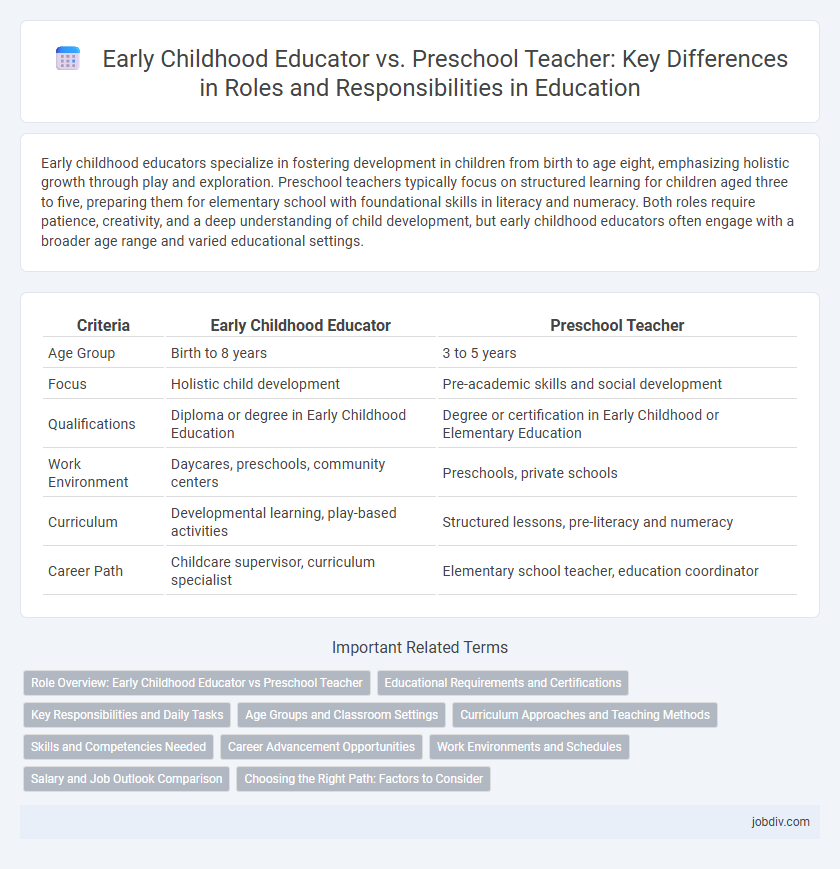Early childhood educators specialize in fostering development in children from birth to age eight, emphasizing holistic growth through play and exploration. Preschool teachers typically focus on structured learning for children aged three to five, preparing them for elementary school with foundational skills in literacy and numeracy. Both roles require patience, creativity, and a deep understanding of child development, but early childhood educators often engage with a broader age range and varied educational settings.
Table of Comparison
| Criteria | Early Childhood Educator | Preschool Teacher |
|---|---|---|
| Age Group | Birth to 8 years | 3 to 5 years |
| Focus | Holistic child development | Pre-academic skills and social development |
| Qualifications | Diploma or degree in Early Childhood Education | Degree or certification in Early Childhood or Elementary Education |
| Work Environment | Daycares, preschools, community centers | Preschools, private schools |
| Curriculum | Developmental learning, play-based activities | Structured lessons, pre-literacy and numeracy |
| Career Path | Childcare supervisor, curriculum specialist | Elementary school teacher, education coordinator |
Role Overview: Early Childhood Educator vs Preschool Teacher
Early Childhood Educators specialize in nurturing the developmental stages of children from birth to age eight, emphasizing holistic growth through tailored learning experiences. Preschool Teachers focus primarily on structured educational activities for children aged three to five, fostering foundational skills in literacy, numeracy, and social interaction. Both roles require expertise in child development, but Early Childhood Educators often engage with broader age ranges and diverse developmental needs.
Educational Requirements and Certifications
Early Childhood Educators typically require a diploma or associate degree in early childhood education, often complemented by certifications such as CPR and First Aid to meet regulatory standards. Preschool Teachers usually hold a bachelor's degree in early childhood education or a related field, with state-specific teaching licenses and certifications like the Child Development Associate (CDA) credential enhancing their qualifications. Both roles demand ongoing professional development to stay compliant with educational standards and improve classroom effectiveness.
Key Responsibilities and Daily Tasks
Early childhood educators focus on fostering developmental milestones in children from birth to age eight through tailored activities that promote social, emotional, and cognitive growth, while preschool teachers primarily design and implement curriculum-based learning for children ages three to five. Both roles involve observing child behavior, assessing progress, and communicating with parents, but preschool teachers spend more time preparing educational materials and conducting structured lessons. Daily tasks for early childhood educators include creating safe learning environments and supporting individual developmental needs, whereas preschool teachers emphasize group activities and foundational academic skills.
Age Groups and Classroom Settings
Early childhood educators typically work with children from birth to age eight in diverse settings such as daycare centers, preschools, and early learning programs, focusing on developmental milestones. Preschool teachers specifically instruct children ages three to five within structured preschool classrooms, emphasizing early literacy, social skills, and foundational academics. Both roles require tailored approaches to age-appropriate curriculum and classroom management to support cognitive and emotional growth.
Curriculum Approaches and Teaching Methods
Early childhood educators implement diverse curriculum approaches such as Reggio Emilia, Montessori, and HighScope, emphasizing child-centered, play-based learning tailored to developmental stages. Preschool teachers often follow structured curricula aligned with state standards, focusing on foundational literacy, numeracy, and social skills through group activities and guided instruction. Both roles prioritize fostering creativity, critical thinking, and social-emotional development, but early childhood educators typically incorporate more individualized learning plans and exploratory methods.
Skills and Competencies Needed
Early Childhood Educators require strong foundational skills in child development, communication, and creating inclusive learning environments, emphasizing emotional support and social skill facilitation. Preschool Teachers need competencies in curriculum design, classroom management, and early literacy and numeracy instruction tailored to ages three to five. Both roles demand patience, creativity, and the ability to assess and adapt teaching strategies to meet diverse developmental needs.
Career Advancement Opportunities
Early childhood educators often have broader career advancement opportunities in special education, administrative roles, or curriculum development due to their comprehensive training in child development. Preschool teachers typically advance by gaining certifications or specializing in early childhood education, enabling them to lead classrooms or transition into educational coordination roles. Both career paths benefit from continued professional development and higher education to enhance leadership prospects within early learning institutions.
Work Environments and Schedules
Early childhood educators often work in diverse settings including daycare centers, family homes, and community programs with flexible schedules that may include part-time or full-time hours. Preschool teachers typically operate within formal educational institutions such as public or private preschools, following structured full-day schedules aligned with school calendars. Both roles require adaptability to accommodate varying age groups and program requirements, but preschool teachers usually experience more consistent hours compared to the variable shifts of early childhood educators.
Salary and Job Outlook Comparison
Early Childhood Educators earn an average salary of $30,000 to $45,000 annually, with job growth projected at 5% through 2030, reflecting steady demand in childcare centers and preschools. Preschool Teachers typically earn between $28,000 and $43,000 per year, with a slightly faster job outlook growth of about 6%, driven by increasing enrollment in early education programs. Both roles require specialized training, but Preschool Teachers often work in more formal educational settings, influencing salary variations and employment opportunities.
Choosing the Right Path: Factors to Consider
Early Childhood Educators typically work with children from birth to age 8, providing foundational learning and development, while Preschool Teachers focus primarily on children aged 3 to 5 in classroom settings. Factors such as desired age group specialization, educational requirements, certification standards, and career goals play crucial roles in choosing between these paths. Understanding state-specific licensing and the scope of curriculum development can help optimize your decision for a rewarding career in early childhood education.
Early Childhood Educator vs Preschool Teacher Infographic

 jobdiv.com
jobdiv.com